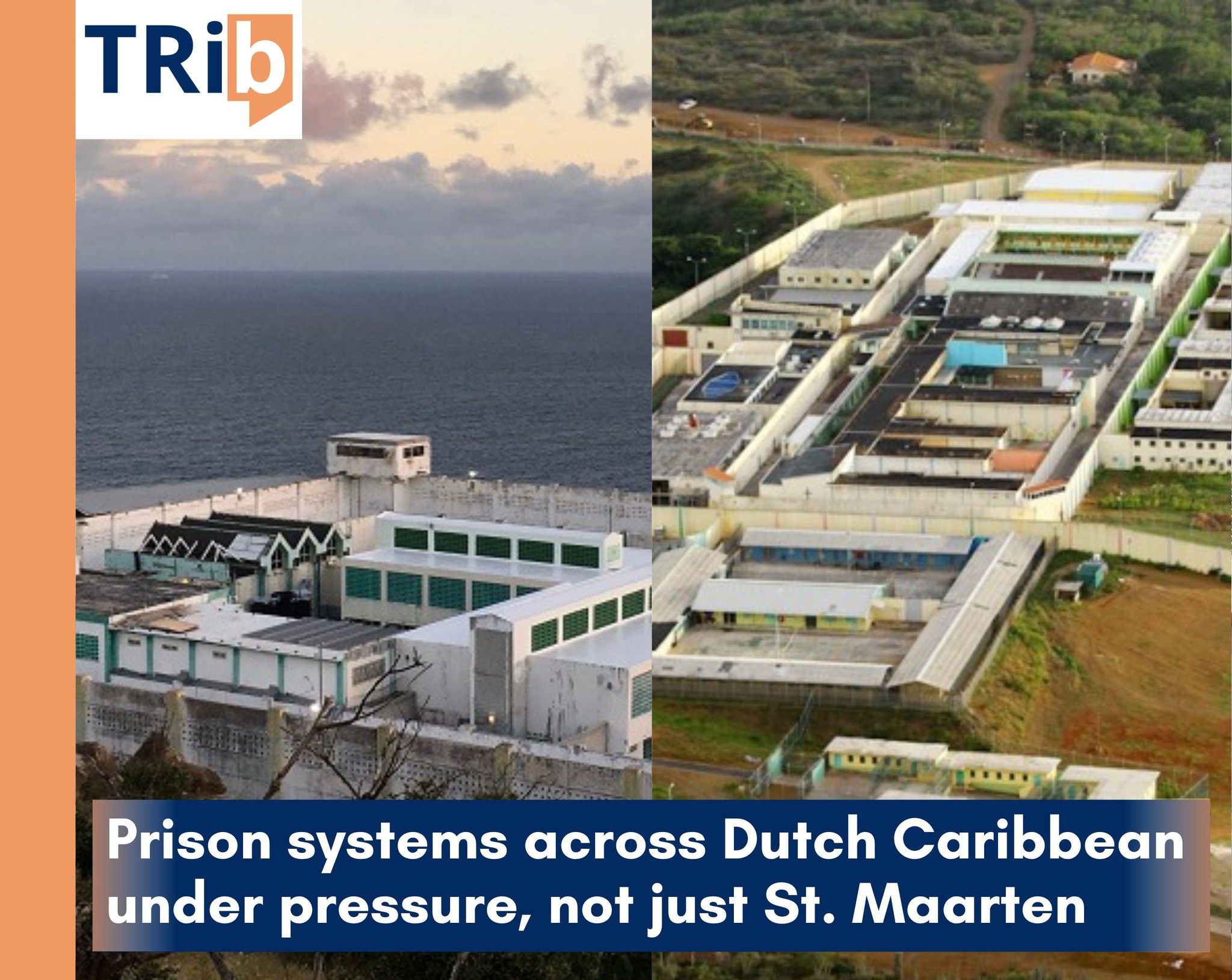GREAT BAY--While St. Maarten’s Point Blanche prison has recently drawn attention for its overcrowding and safety concerns, new developments out of The Hague confirm that the strain on prison systems extends across the entire Dutch Caribbean. The prisons in Bonaire, Curaçao, and Aruba are also facing mounting pressures due to limited space, staffing shortages, and increasing inmate populations, raising broader concerns about the Kingdom of the Netherlands' ability to manage detention across its territories.
𝐃𝐞𝐭𝐞𝐧𝐭𝐢𝐨𝐧 𝐂𝐚𝐩𝐚𝐜𝐢𝐭𝐲 𝐑𝐞𝐚𝐜𝐡𝐢𝐧𝐠 𝐋𝐢𝐦𝐢𝐭𝐬 𝐢𝐧 𝐁𝐨𝐧𝐚𝐢𝐫𝐞
In a recent letter to the Dutch House of Representatives, State Secretary for Legal Protection Teun Struycken described the situation in the prison on Bonaire as "very worrying." According to Struycken, the capacity issues are so severe that suspects are being released without serving their sentences, and some convicts are being released without supervision.
The primary driver of the overcrowding, according to Struycken, is the increasing number of foreign detainees, particularly Venezuelans arrested at sea during drug transport operations. These individuals, referred to in official documents as VRIS’ers (foreigners in the criminal justice system), now occupy more than 25 percent of available space at the Caribbean Netherlands Correctional Institution (JICN).
The prison is also struggling with staff shortages, which further complicate daily operations. Basic elements of detention such as structured day programs and reintegration activities are often canceled due to the lack of personnel. The Council for Law Enforcement has noted that safety concerns now affect both inmates and staff, and that immigration detention has all but stopped functioning due to insufficient staffing.
Although the Dutch Custodial Institutions Agency (DJI) in the European Netherlands has promised assistance, the Council for Law Enforcement warns that this only addresses short-term concerns. There is currently no long-term solution in place, and options like prison expansion or new forms of supervised release, such as electronic monitoring, are still being explored.
𝐒𝐭. 𝐌𝐚𝐚𝐫𝐭𝐞𝐧: 𝐇𝐢𝐠𝐡 𝐈𝐧𝐦𝐚𝐭𝐞 𝐍𝐮𝐦𝐛𝐞𝐫𝐬 𝐚𝐧𝐝 𝐔𝐧𝐬𝐞𝐫𝐯𝐞𝐝 𝐒𝐞𝐧𝐭𝐞𝐧𝐜𝐞𝐬
On St. Maarten, the situation is even more constrained. The Point Blanche prison, which was originally built to hold around 80 detainees, has been operating far beyond its intended capacity. There are now over 200 convicted individuals waiting to serve their sentences, and the court has issued more than 300 years’ worth of sentences that have not yet been executed.
Due to this backlog, judges are increasingly choosing not to impose pretrial detention, not based on the seriousness of the crime, but because of the shortage of space. The government is moving ahead with plans for a new facility, which will provide room for 196 inmates. However, projections indicate that the new prison will be filled as soon as it opens.
𝐂𝐮𝐫𝐚ç𝐚𝐨: 𝐋𝐨𝐧𝐠𝐬𝐭𝐚𝐧𝐝𝐢𝐧𝐠 𝐂𝐨𝐦𝐩𝐥𝐚𝐢𝐧𝐭𝐬 𝐟𝐫𝐨𝐦 𝐏𝐫𝐢𝐬𝐨𝐧 𝐒𝐭𝐚𝐟𝐟
In Curaçao, the Sentro di Detenshon i Korekshon Kòrsou (SDKK) is also dealing with persistent problems. According to the ABVO union, prison staff have faced the same unresolved issues for over a decade. These include shortages of personnel, unfilled vacancies, safety concerns, and a lack of financial support.
Recently, union leader Gregory Wilson stated that some employees are being asked to perform duties outside their job descriptions because there are not enough workers. At the same time, he said, they are being told they are not officially qualified to hold certain roles. The union has called this situation unacceptable and has urged the Ministry of Justice to take immediate corrective action.
SDKK has also faced periodic unrest over the years, including reported instances of violence, inadequate working conditions, and calls for external intervention to improve the facility’s management and infrastructure.
𝐒𝐲𝐬𝐭𝐞𝐦𝐢𝐜 𝐈𝐬𝐬𝐮𝐞𝐬 𝐀𝐜𝐫𝐨𝐬𝐬 𝐭𝐡𝐞 𝐊𝐢𝐧𝐠𝐝𝐨𝐦
While Aruba has not recently made headlines, the Dutch Caribbean’s broader detention problems have been known to oversight bodies and are not limited to one island. Reports from recent years have pointed to similar conditions, aging infrastructure, capacity constraints, and underinvestment in staffing and rehabilitation.
The Dutch government has implemented some measures in the Netherlands to relieve pressure on prisons, such as early-release programs and the use of multi-person cells, but it remains unclear whether these strategies can be applied effectively in the Caribbean territories.
State Secretary Struycken has proposed several ideas for Bonaire, including the potential expansion of facilities and introducing electronic monitoring for some detainees. However, he acknowledged that these proposals will take time to develop and implement and that immediate relief is limited.
Join Our Community Today
Subscribe to our mailing list to be the first to receive
breaking news, updates, and more.






